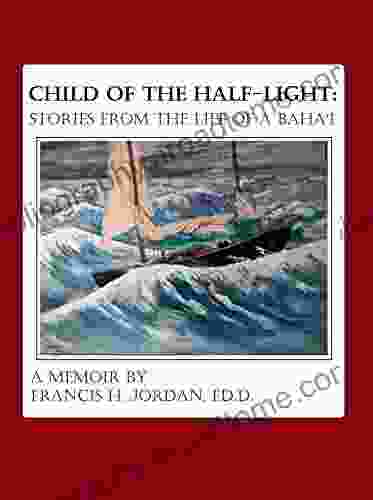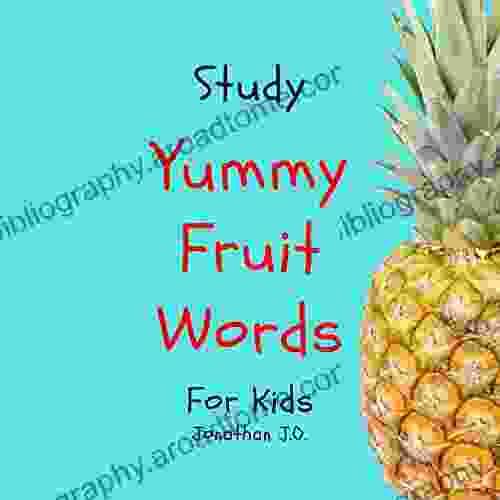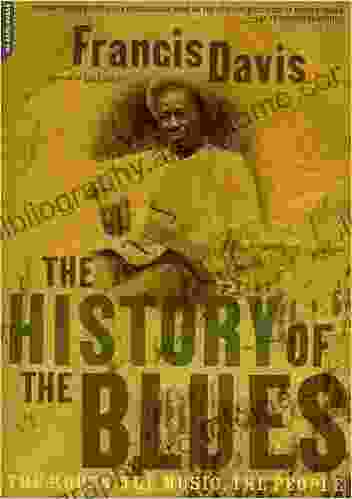Study Yummy Fruit Words: The Ultimate Guide to Understanding and Using Fruit Vocabulary

Fruits, with their vibrant colors, diverse shapes, and delectable flavors, have captured the imagination of humans throughout history. From ancient civilizations that revered fruits as symbols of fertility and abundance to modern-day societies that appreciate their nutritional value and culinary versatility, fruits have played a significant role in our lives.
Language, being the powerful tool that it is, has evolved to reflect this fascination with fruits. Over the centuries, numerous words have been coined to describe the myriad varieties of fruits, their unique characteristics, and their various uses. These words, collectively known as fruit vocabulary, provide us with the means to communicate about fruits effectively and to delve deeper into their fascinating world.
5 out of 5
| Language | : | English |
| File size | : | 6308 KB |
| Print length | : | 30 pages |
| Lending | : | Enabled |
Origins and Meanings of Fruit Words
The origins of fruit words can be traced back to various languages and cultures, reflecting the global nature of fruit cultivation and consumption. Many fruit words have Latin or Greek roots, as these languages were widely used in scientific classification during ancient times. For example, the word "apple" comes from the Latin word "malum," which simply means "apple." Similarly, the word "banana" is derived from the Arabic word "banan," which refers to the finger-like shape of the fruit.
Other fruit words have more interesting etymologies. The word "orange," for instance, comes from the Sanskrit word "naranga," which means "fragrant." This aptly captures the citrusy aroma of oranges. The word "strawberry," on the other hand, is believed to have originated from the Old English word "streawberie," which refers to the fruit's resemblance to straw.
Exploring the Richness of Fruit Vocabulary
The vocabulary of fruits is not limited to simply naming different varieties. It also encompasses words that describe their appearance, taste, texture, and uses. For instance, we have words like "juicy," "sweet," "tart," and "firm" to describe the sensory qualities of fruits. We also have words like "peel," "pit," and "core" to refer to the different parts of fruits.
In addition to these basic words, there are also more specialized terms used in the culinary and scientific fields. For example, a "drupe" is a type of fruit that has a fleshy outer layer and a hard inner pit, such as a peach or an apricot. A "berry," on the other hand, is a fruit that has a soft, juicy flesh and numerous small seeds, such as a strawberry or a blueberry.
Using Fruit Vocabulary Effectively
A rich fruit vocabulary is essential for effective communication about fruits. It allows us to convey our thoughts and ideas clearly and precisely. Whether you are a food writer describing the flavors of a new fruit dish, a botanist discussing the anatomy of a fruit, or simply a fruit enthusiast sharing your passion with others, a strong fruit vocabulary will enhance your ability to express yourself.
Furthermore, a good understanding of fruit vocabulary can also help us make informed choices when it comes to selecting and consuming fruits. By understanding the different varieties of fruits and their unique properties, we can tailor our fruit consumption to meet our specific dietary needs and preferences.
The world of fruits is vast and diverse, and so is the vocabulary that surrounds it. By studying yummy fruit words, we not only expand our language skills but also deepen our understanding of this fascinating aspect of the natural world. Whether you are a student, a writer, a foodie, or simply someone who appreciates the beauty and bounty of fruits, I encourage you to embark on this journey of fruit vocabulary exploration. Embrace the etymology, meanings, and usage of these words, and let them enrich your communication, knowledge, and appreciation of all things fruity.
So, what are you waiting for? Dive into the world of fruit words today and discover the sweet, juicy, and delectable flavors of language!
5 out of 5
| Language | : | English |
| File size | : | 6308 KB |
| Print length | : | 30 pages |
| Lending | : | Enabled |
Do you want to contribute by writing guest posts on this blog?
Please contact us and send us a resume of previous articles that you have written.
 Book
Book Novel
Novel Page
Page Chapter
Chapter Text
Text Story
Story Genre
Genre Reader
Reader Library
Library Paperback
Paperback E-book
E-book Magazine
Magazine Newspaper
Newspaper Paragraph
Paragraph Sentence
Sentence Bookmark
Bookmark Shelf
Shelf Glossary
Glossary Bibliography
Bibliography Foreword
Foreword Preface
Preface Synopsis
Synopsis Annotation
Annotation Footnote
Footnote Manuscript
Manuscript Scroll
Scroll Codex
Codex Tome
Tome Bestseller
Bestseller Classics
Classics Library card
Library card Narrative
Narrative Biography
Biography Autobiography
Autobiography Memoir
Memoir Reference
Reference Encyclopedia
Encyclopedia Kristen Thomasino
Kristen Thomasino Naomi Nadson
Naomi Nadson Erin T Gates
Erin T Gates Rev Stephanie Red Feather
Rev Stephanie Red Feather Safiya Martin
Safiya Martin Henry Notaker
Henry Notaker Julia Cruise
Julia Cruise Scott Carney
Scott Carney Frances Billinghurst
Frances Billinghurst Eve Heidi Bine Stock
Eve Heidi Bine Stock Randy White
Randy White Faithe Wempen
Faithe Wempen Emma Seppala
Emma Seppala Eugene Vale
Eugene Vale Elsa Kirvel
Elsa Kirvel Felicia Starr
Felicia Starr Faith Ann Smith
Faith Ann Smith Fiza Pathan
Fiza Pathan Esther J Keller
Esther J Keller Emmanuel Odum Ocran
Emmanuel Odum Ocran
Light bulbAdvertise smarter! Our strategic ad space ensures maximum exposure. Reserve your spot today!
 Herbert CoxFollow ·11.5k
Herbert CoxFollow ·11.5k Jason HayesFollow ·11k
Jason HayesFollow ·11k Aubrey BlairFollow ·18.1k
Aubrey BlairFollow ·18.1k Osamu DazaiFollow ·12.5k
Osamu DazaiFollow ·12.5k Ira CoxFollow ·4k
Ira CoxFollow ·4k Glenn HayesFollow ·3.5k
Glenn HayesFollow ·3.5k Jimmy ButlerFollow ·13.1k
Jimmy ButlerFollow ·13.1k Rodney ParkerFollow ·3.6k
Rodney ParkerFollow ·3.6k

 Troy Simmons
Troy SimmonsStories From The Life Of Baha: A Must-Read For Spiritual...
Discover the Inspiring Teachings and Enriching...

 Wesley Reed
Wesley ReedDuke Review of MRI Principles: Case Review - Your Gateway...
Unveiling the Essence...

 Ralph Waldo Emerson
Ralph Waldo EmersonThe Big Book of NFTs: Your Ultimate Guide to the Digital...
In the rapidly evolving world of digital...

 Jason Hayes
Jason HayesUnveiling the Labyrinth: The Cheat Sheet Novel and its...
In the realm...
5 out of 5
| Language | : | English |
| File size | : | 6308 KB |
| Print length | : | 30 pages |
| Lending | : | Enabled |
















